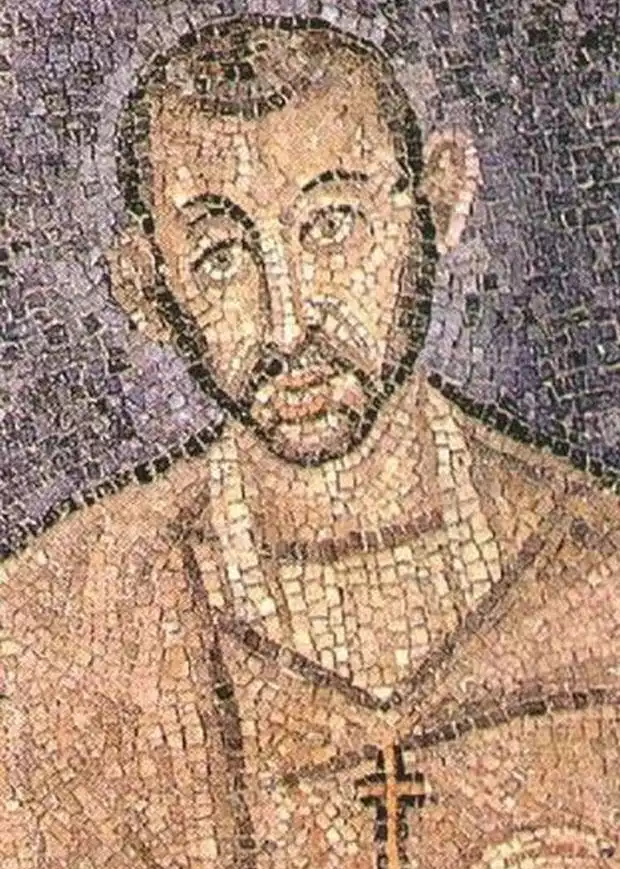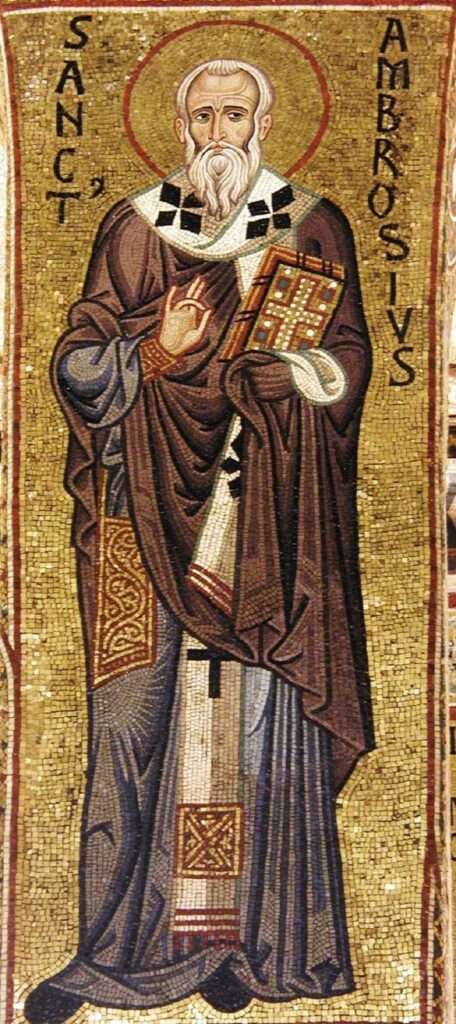
Ambrose of Milan, born around 340 AD and passing away in 397 AD, stands as one of the most influential figures in early Christian history. His life and works significantly shaped Christian theology, particularly in the Western Church. As Bishop of Milan, Ambrose was renowned for his eloquent preaching, his staunch stand against Arianism, and his influential role in the conversion of Saint Augustine.
Early Life and Career
Ambrose, born into a Roman Christian family, quickly ascended the ranks of the Roman government. His rapid rise to prominence was marked by his appointment as the Governor of Liguria and Emilia, headquartered in Milan. In 374 AD, following the death of the Arian bishop Auxentius, Ambrose was surprisingly chosen as Bishop of Milan, despite being a catechumen at the time. This unusual appointment reflected his widely recognized ability and integrity.
Ambrose’s early life and ascension to the episcopate demonstrate a remarkable journey of faith and leadership. His transition from government official to religious leader was not only a significant shift in his personal life but also marked a turning point in the history of the Christian Church. His influence extended beyond the boundaries of Milan, impacting the broader sphere of Christian theology and ecclesiastical politics.
Theological Contributions and Ecclesiastical Leadership
Ambrose’s tenure as Bishop was marked by significant theological contributions and strong ecclesiastical leadership. He ardently opposed Arianism, a doctrine that denied the divinity of Jesus Christ, and played a crucial role in its decline. His theological works, notably “De Fide” and “De Spiritu Sancto,” were instrumental in articulating and defending the Nicene Creed’s positions.
Ambrose’s leadership extended beyond theological disputes. He is remembered for his role in the conversion of Augustine of Hippo, who would later become one of Christianity’s most influential theologians. The mentorship and guidance provided by Ambrose were pivotal in Augustine’s spiritual journey, illustrating the profound impact of Ambrose’s pastoral care.
Stand Against Imperial Influence
Ambrose’s tenure as Bishop of Milan was also notable for his firm stand against imperial influence in church affairs. This aspect of his leadership was particularly evident in his confrontations with Roman emperors, which highlighted his commitment to the independence and moral authority of the church.
One of the most famous incidents involved Emperor Theodosius I. In 390 AD, following a massacre in Thessalonica, Ambrose demanded that Theodosius repent for his actions. The emperor’s initial resistance, followed by eventual submission to Ambrose’s demands, marked a significant moment in the history of the Christian church. It underscored the principle that secular authority, even that of an emperor, was subject to the moral and spiritual authority of the church. This confrontation also illustrated Ambrose’s courage and his unflinching commitment to justice and accountability, regardless of the status of those he challenged.
Moreover, Ambrose’s resistance to imperial interference wasn’t limited to matters of morality and justice. He was equally staunch in defending the theological and doctrinal purity of the church. His refusal to cede a church in Milan for Arian worship, despite direct imperial pressure, was a bold statement about the church’s autonomy and the primacy of orthodox Christian teaching over state-imposed religious pluralism.
Contributions to Liturgy and Church Music
In addition to his theological and political contributions, Ambrose of Milan significantly influenced the development of Christian liturgy and church music. He introduced antiphonal chanting to the Western Church, a practice where two choirs sing in alternation, enhancing the worship experience. This innovation not only enriched the liturgical practices but also played a role in unifying the congregants, fostering a sense of communal worship and participation.
Ambrose is also credited with composing several hymns, many of which remain a part of the church’s liturgical repertoire. These hymns, characterized by their doctrinal clarity and depth, served as both educational and devotional tools. They were instrumental in disseminating orthodox Christian beliefs and countering heretical ideas prevalent at the time.
His contribution to church music and liturgy reflects his understanding of the role of art and music in spiritual formation and worship. Ambrose recognized the power of music to convey theological truths and to touch the hearts and minds of believers, thereby deepening their faith and devotion. His legacy in this area has had a lasting impact, shaping the worship practices of generations of Christians.
Advocacy for Social Justice and Moral Teachings
Ambrose of Milan’s influence extended into the realm of social justice and moral teachings, underscoring his commitment to applying Christian ethics to societal issues. His advocacy for the poor and marginalized was a hallmark of his episcopacy, reflecting a deep understanding of the Gospel’s call to care for the less fortunate.
Ambrose’s writings and sermons frequently addressed themes of social justice, emphasizing the Christian duty to aid those in need. He advocated for the fair treatment of the poor and condemned the accumulation of wealth at their expense. His teachings on wealth and poverty challenged the societal norms of his time, urging Christians to view their resources not as personal possessions but as gifts from God meant to be shared with others.
His stance on social issues also included vocal opposition to slavery and the slave trade, a position that was radical for his era. Ambrose’s denunciation of slavery highlighted his broader commitment to the dignity and worth of every human being, a principle deeply rooted in Christian doctrine.
Legacy and Canonization
The legacy of Ambrose of Milan extends far beyond his lifetime. He was canonized as a saint, and his feast day is celebrated on December 7th. As a Doctor of the Church, a title given to saints recognized as having made significant contributions to theology through their scholarly works, Ambrose’s teachings continue to be studied and revered.
His influence is evident in various aspects of Christian theology, particularly in the areas of ecclesiology, Christology, and moral theology. Ambrose’s works have been crucial in shaping the Western Church’s doctrines and practices. His writings, characterized by their clarity, depth, and eloquence, remain a vital part of Christian literature.
Ambrose’s impact on Christian art and culture is also notable. He has been a subject of numerous artistic representations, and his life and teachings have inspired countless works of art, literature, and music over the centuries.
The enduring legacy of Ambrose of Milan is a testament to his profound influence on the Christian Church. His life and teachings continue to inspire and guide Christians worldwide, underscoring his role as one of the pivotal figures in the history of Christianity.
Influence on Western Christianity and Conclusion
Ambrose of Milan’s profound impact on Western Christianity is evident through his enduring influence on church doctrine, liturgical practices, and Christian ethics. His approach to integrating classical learning with Christian teachings helped lay the foundation for medieval scholasticism, influencing thinkers like Thomas Aquinas. Ambrose’s interpretation of the Scriptures, particularly his emphasis on allegorical and moral readings, shaped the Western Church’s approach to biblical exegesis.
Ambrose’s role in the development of the Western monastic tradition also merits attention. While not a monk himself, his teachings on asceticism and his lifestyle inspired many to pursue monasticism, thus contributing to the spread of monastic communities in the West.
In conclusion, Ambrose of Milan was not only a pivotal figure in the history of the early Church but also a lasting influence on the development of Western Christianity. His contributions to theology, liturgy, ecclesiastical politics, and social justice have left an indelible mark on Christian history.
Feast Day: December 7
References
- Cambridge University Press. “The Politics of Heresy in Ambrose of Milan.” Accessed December 21, 2023.
- Duke University. “Virginity Discourse and Ascetic Politics in the Writings of Ambrose of Milan.” Accessed December 21, 2023.
- JSTOR. “Ambrose of Milan: Church and Court in a Christian Capital.” Accessed December 21, 2023.
- Travers, Rowan. “Ambrose of Milan and the End of the Arian-Nicene Conflicts.” Oxford University Press, 1997.
- Trinity College. The Influence of Ambrose of Milan on the Early Christian Church.” Accessed December 21, 2023.
- Williams, Daniel H. “Ambrose of Milan and the Triumph of the Nicene Creed.” Yale University Press, 1995.

